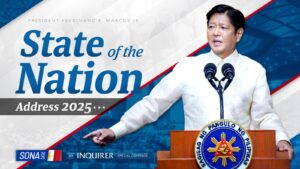MANILA, Philippines—Vice president Jejomar Binay is urging the national government to tap its $75-billion gross international reserves to fund development projects and open the door to more local public borrowing.
In a speech before members of the Philippine Chamber of Commerce and Industry on Wednesday, he said the country’s large GIR would be a viable source of funds for projects that would promote social and economic development.
“If the national government could be persuaded to utilize its large gross international reserves of $75 billion for its development projects, the (public-private partnership) could open up in various areas, giving a big boost to business activity nationwide,” he said.
“This could also shift the source of public borrowing from foreign financial institutions to the central bank, which could save the government from the rise and fall of the US dollar. I will ask (PCCI) to join me in asking the President to consider using our large dollar reserve for development, and to confine public borrowing to local sources,” he added.
According to the Bureau of the Treasury, 58 percent, or P2.736 trillion, of the country’s total outstanding debt was secured from domestic lenders. This figure represented a 0.8-percent decrease from P2.759 trillion in June, due to the government’s decision to redeem more debt notes against the new ones that had been issued.
The country’s foreign currency debt, which accounted for 42 percent of the total, stood at P2.01 trillion, booked in US dollar, euro, and yen. These came from multilateral lenders and official aid from foreign governments, as well as from proceeds from foreign currency-denominated bonds.
Foreign borrowings decreased by P40.7 billion, or 2 percent, from that of June, due mainly to the appreciation of the peso against the US dollar, which shaved off P64 billion from the debt stock. The government, however, posted P1 billion in new borrowings versus debt payments made in July.
According to Finance Secretary Cesar Purisima, the country’s current borrowing mix is 75 percent domestic and 25 percent foreign. The government, however, is still looking at the global financial market.
“We’re looking at the (global financial) market to take advantage of opportunities, lengthen maturities, reduce bunching (of maturities), reduce forex mix, increase the peso component, and take advantage of the low interest environment. We continue to be opportunistic,” he said.



